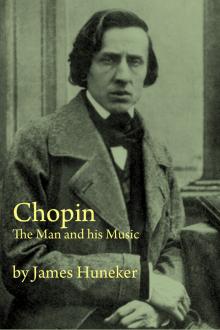Haydn, J. Cuthbert Hadden [books for new readers .TXT] 📗

- Author: J. Cuthbert Hadden
Book online «Haydn, J. Cuthbert Hadden [books for new readers .TXT] 📗». Author J. Cuthbert Hadden
His Industry
The world has seen many an instance of genius without industry, as of industry without genius. In Haydn the two were happily wedded. He was always an early riser, and long after his student days were over he worked steadily from sixteen to eighteen hours a day. He lived strictly by a self-imposed routine, and was so little addicted to what Scott called "bed-gown and slipper tricks," that he never sat down to work or received a visitor until he was fully dressed. He had none of Wagner's luxurious tastes or Balzac's affectations in regard to a special attire for work, but when engaged on his more important compositions he always wore the ring given him by the King of Prussia. In Haydn's case there are no incredible tales of dashing off scores in the twinkling of an eye. That he produced so much must be attributed to his habit of devoting all his leisure to composition. He was not a rapid worker if we compare him with Handel and Mozart. He never put down anything till he was "quite sure it was the right thing"--a habit of mind indicated by his neat and uniform handwriting ["His notes had such little heads and slender tails that he used, very properly, to call them his, flies' legs."--Bombet, p. 97.]--and he assures us: "I never was a quick writer, and always composed with care and deliberation. That alone," he added, "is the way to compose works that will last, and a real connoisseur can see at a glance whether a score has been written in undue haste or not." He is quoted as saying that "genius is always prolific." However the saying may be interpreted, there does not seem to have been about him anything of what has been called the irregular dishabille of composers, "the natural result of the habit of genius of watching for an inspiration, and encouraging it to take possession of the whole being when it comes."
Habits of Composition
His practice was to sketch out his ideas roughly in the morning, and elaborate them in the afternoon, taking pains to preserve unity in idea and form. "That is where so many young composers fail," he said in reference to the latter point. "They string together a number of fragments; they break off almost as soon as they have begun, and so at the end the listener carries off no definite impression." The importance of melody he specially emphasized. "It is the air which is the charm of music," he remarked, "and it is that which is most difficult to produce. The invention of a fine melody is the work of genius." In another place he says: "In vocal composition, the art of producing beautiful melody may now almost be considered as lost; and when a composer is so fortunate as to throw forth a passage that is really melodious, he is sure, if he be not sensible of its excellence, to overwhelm and destroy it by the fullness and superfluity of his instrumental parts." [Compare Mozart's words as addressed to Michael Kelly: "Melody is the essence of music. I should liken one who invents melodies to a noble racehorse, and a mere contrapuntist to a hired post-hack."]
He is stated to have always composed with the aid of the pianoforte or harpsichord; and indeed we find him writing to Artaria in 1788 to say that he has been obliged to buy a new instrument "that I might compose your clavier sonatas particularly well." This habit of working out ideas with the assistance of the piano has been condemned by most theorists as being likely to lead to fragmentariness. With Haydn at any rate the result was entirely satisfactory, for, as Sir Hubert Parry points out, the neatness and compactness of his works is perfect. It is very likely, as Sir Hubert says, that most modern composers have used the pianoforte a good deal--not so much to help them to find out their ideas, as to test the details and intensify their musical sensibility by the excitant sounds, the actual sensual impression of which is, of course, an essential element in all music. The composer can always hear such things in his mind, but obviously the music in such an abstract form can never have quite as much effect upon him as when the sounds really strike upon his ear. [See Studies of Great Composers, by C. Hubert H. Parry, p. 109.]
No Pedant
Like all the really great composers, Haydn was no pedant in the matter of theoretical formulae, though he admitted that the rigid rules of harmony should rarely be violated, and "never without the compensation of some inspired effect." When he was asked according to what rule he had introduced a certain progression, he replied "The rules are all my very obedient humble servants." With the quint-hunters and other faddists who would place their shackles on the wrists of genius, he had as little patience as Beethoven, who, when told that all the authorities forbade the consecutive fifths in his C Minor Quartet, thundered out: "Well, I allow them." Somebody once questioned him about an apparently unwarranted passage in the introduction to Mozart's Quartet in C Major. "If Mozart has written it, be sure he had good reasons for doing so," was the conclusive reply. That fine old smoke-dried pedant, Albrechtsberger, declared against consecutive fourths in strict composition, and said so to Haydn. "What is the good of such rules?" demanded Haydn. "Art is free and must not be fettered by mechanical regulations. The cultivated ear must decide, and I believe myself as capable as anyone of making laws in this respect. Such trifling is absurd; I wish instead that someone would try to compose a really new minuet." To Dies he remarked further: "Supposing an idea struck me as good and thoroughly satisfactory both to the ear and the heart, I would far rather pass over some slight grammatical error than sacrifice what seemed to me beautiful to any mere pedantic trifling." These were sensible views. Practice must always precede theory. When we find a great composer infringing some rule of the old text-books, there is, to say the least, a strong presumption, not that the composer is wrong, but that the rule needs modifying. The great composer goes first and invents new effects: it is the business of the theorist not to cavil at every novelty, but to follow modestly behind and make his rules conform to the practice of the master. [Compare Professor Prout's Treatise on Harmony.]
Thus much about Haydn the man. Let us now turn to Haydn the composer and his position in the history of music.
CHAPTER X(HAYDN: THE COMPOSER)The Father of Instrumental Music--The Quartets--The Symphonies-- The Salomon Set--The Sonatas--Church Music--Songs--Operas-- Orchestration--General Style--Conclusion.
The Father of Instrumental Music
Haydn has been called "the father of instrumental music," and although rigid critics may dispute his full right to that title, on broad grounds he must be allowed to have sufficiently earned it. He was practically the creator of more than one of our modern forms, and there was hardly a department of instrumental music in which he did not make his influence felt. This was emphatically the case with the sonata, the symphony and the string quartet. The latter he brought to its first perfection. Before his time this particular form of chamber music was long neglected, and for a very simple reason. Composers looked upon it as being too slight in texture for the display of their genius. That, as has often been demonstrated, was because they had not mastered the art of "writing a four-part harmony with occasional transitions into the pure polyphonic style--a method of writing which is indispensable to quartet composition--and also because they did not yet understand the scope and value of each individual instrument."
The Quartet
It would be too much to say that even Haydn fully realized the capacities of each of his four instruments. Indeed, his quartet writing is often bald and uninteresting. But at least he did write in four-part harmony, and it is certainly to him that we owe the installation of the quartet as a distinct species of chamber music. "It is not often," says Otto Jahn, the biographer of Mozart, "that a composer hits so exactly upon the form suited to his conceptions; the quartet was Haydn's natural mode of expressing his feelings." This is placing the Haydn quartet in a very high position among the products of its creator. But its artistic value and importance cannot well be over-estimated. Even Mozart, who set a noble seal upon the form, admitted that it was from Haydn he had first learned the true way to compose quartets; and there have been enthusiasts who regarded the Haydn quartet with even more veneration than the Haydn symphony. No fewer than seventy-seven quartets are ascribed to him. Needless to say, they differ considerably as regards their style and treatment, for the first was written so early as 1755, while the last belongs to his later years. But they are all characterized by the same combination of manly earnestness, rich invention and mirthful spirit. The form is concise and symmetrical, the part-writing is clear and well-balanced, and a "sunny sweetness" is the prevailing mood. As a discerning critic has remarked, there is nothing in the shape of instrumental music much pleasanter and easier to listen to than one of Haydn's quartets. The best of them hold their places in the concert-rooms of to-day, and they seem likely to live as long as there are people to appreciate clear and logical composition which attempts nothing beyond "organized simplicity." [See W. J. Henderson's How Music Developed, p. 191: London, 1899]. In this department, as Goethe said, he may be superseded, but he can never be surpassed.
The Symphony
For the symphony Haydn did no less than for the quartet. The symphony, in his young days, was not precisely the kind of work which now bears the name. It was generally written for a small band, and consisted of four parts for strings and four for wind instruments. It was meant to serve no higher





Comments (0)